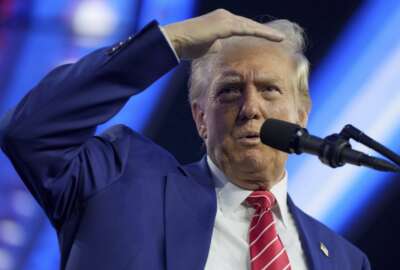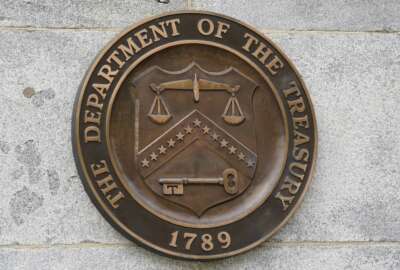USPS next-gen fleet lawsuits dropped, but electric vehicle plans still under scrutiny
USPS no longer face legal hurdles over its fleet acquisition plans. But the incoming Trump administration and Republicans members of Congress are skeptical.
A yearslong legal battle over the Postal Service’s next-generation vehicle fleet is over.
California and 16 other states, plus the District of Columbia and several major cities, dropped a lawsuit last month that challenged the USPS’ plans in 2022 to purchase mostly gas-powered delivery vehicles in the coming years.
USPS now plans to purchase mostly electric delivery vehicles, after receiving $3 billion to do so in the Inflation Reduction Act.
A similar lawsuit filed by environmental groups has also been dismissed.
The lawsuits claimed USPS set unrealistically high costs for electric vehicles, but underestimated the lifecycle cost of gas-powered vehicles, as part of its obligations requirements under the National Environmental Policy Act.
The 1996 NEPA legislation requires agencies to prepare an Environmental Impact Statement (EIS) when evaluating major federal acquisitions that could significantly affect the environment.
Before Congress passed the Inflation Reduction Act, Postmaster General DeJoy said USPS would make electric vehicles 10% of its next-generation delivery vehicle fleet. The Biden administration publicly criticized those plans.
“I was in the crossfire of a whole bunch of issues, and did not agree to put electric vehicles into our fleet until we had the appropriate cost benefits to the organization,” DeJoy told the House Oversight and Accountability Committee in a hearing last month.
A spokesperson with the California Attorney General’s Office told Federal News Network that the multistate coalition filed its lawsuit in 2022, “USPS increased its planned electric vehicle mix to represent the majority of its purchases.”
“After lengthy consideration, we have determined that it would be in our coalition’s best interests at this time to voluntarily dismiss this case without prejudice given USPS’ commitment to rebuild its fleet with a majority of electric vehicles,” the spokesperson said.
Earthjustice, one of the environmental groups behind the lawsuit, said it is preparing to ensure USPS maintains its commitment to a majority-electric fleet.
According to Reuters, President-elect Donald Trump is considering unwinding the Postal Service’s electric vehicles contracts, as part of an upcoming executive order.
“We are now preparing to defend this critical progress as we hear murmurs that the incoming Trump administration may attempt to unravel the contracts that are getting these nonpolluting vehicles on our roads,” Adrian Martinez, the deputy managing attorney on Earthjustice’s Right To Zero campaign, said in a statement.
Martinez said environmental groups withdrew their lawsuit after seeing “major gains in our campaign to electrify postal trucks.”
“We’re seeing clean new vehicles roll out in neighborhoods around the country and we’re hearing rave reviews from the postal carriers operating them — yet another sign that electrifying mail trucks in the U.S. is commonsense,” she added.
Katherine García, director of the Sierra Club’s Clean Transportation for All, said in a statement that the group’s lawsuit “came at a time when the Postal Service was doubling down on fossil fuel vehicles and moving at a snail’s pace to electrify the nation’s largest government fleet.”
García added that “electric USPS vehicles are beginning to roll into neighborhoods and provide pollution-free deliveries to families.”
“We’re now focused on implementation of the Postal Service’s current EV commitments, ensuring that the Inflation Reduction Act funds are spent on electrification so more and more communities can benefit from cleaner air,” she said.
USPS declined to comment on the lawsuits. However, USPS spokeswoman Kim Frum said, “we continue to believe that our decision that is reflected in our Supplemental Environmental Impact Statement is fully compliant with the National Environmental Policy Act.”
USPS no longer faces any legal hurdles over its fleet acquisition plans. But the incoming Trump administration and Republicans members of Congress are expressing skepticism.
In a press conference Tuesday, Trump told reporters his administration is “going to be ending the electric car mandate,” and railed against climate spending under the Inflation Reduction Act.
“Trillions of dollars — it’s like throwing it right out the window, what they’re doing. And they’re trying to spend so much now, they’re just taking money and giving it to anybody that wants it for any project at all if it’s — if it’s certified under the green new scam. And they don’t work and it’s too expensive,” Trump said.
The Biden administration took steps to ensure electric vehicles made up 50% of all new car and light truck sales by 2030.
President Joe Biden also signed an executive order in December 2021 directing agencies to buy only zero-emission light-duty vehicles starting in 2027, and buy only zero-emission vehicles across all categories by 2035.
An official from the White House Council on Environmental Quality told Federal News Network last month that electric vehicles now make up about 13% of the federal fleet.
The CEQ official said zero-emission vehicles made up about 20% of the federal government’s light-duty vehicle purchases in 2024 — up from just 2% in 2021.
USPS plans for a majority-electric next-generation delivery vehicle fleet are driving much of the federal government’s sustainable fleet progress. USPS owns about 240,000 vehicles, which accounts for about a third of the total federal fleet.
Meanwhile, Republican members of the House Oversight and Accountability Committee are pushing back on USPS plans to purchase mostly electric vehicles in the coming years, and some are calling on the incoming Trump administration’s Department of Government Efficiency (DOGE) to find additional ways for the agency to cut costs.
“I worry about that EV money sitting around, that it may be clawed back,” Committee Chairman James Comer (R-Ky.) said in a hearing in December. “I think there are lots of areas where there’s going to be significant reform over the next four years.”
Government Operations Subcommittee Chairman Pete Sessions (R-Texas), one of three co-chairmen of the Congressional DOGE Caucus said lawmakers in support of DOGE are skeptical of the Postal Service’s plans for a majority-electric next-generation delivery vehicle fleet.
“If you just look at the fleets that people have, cars on an individual basis, they’re thought to be wildly more expensive. Not only to keep up with, but the lifecycle is different,” Sessions said.
DeJoy said he would not have invested in electric vehicles “as aggressively and deliberately as we had,” if USPS didn’t receive $3 billion in funding from Congress.
USPS is spending about $10 billion of its own money on a new fleet of more than 100,000 custom-built and commercial vehicles. About 66,000 of them will be electric vehicles.
“I feel good where we are,” DeJoy said. “We couldn’t put electric vehicles everywhere and we couldn’t put electric vehicles in overnight. But once installed, and you offset the capital cost, which we have, it’s a pretty decent thing. It’s a nice vehicle.”
USPS expects its custom-built Next-Generation Delivery Vehicles will run for about 20-25 years. DeJoy said some of the agency’s electric vehicles can run for about three days on a single charge, and that he is looking at ways to “expand the ratio between the vehicles and the chargers.”
DeJoy said USPS will see lower maintenance costs with EVs, and would save on fuel costs. But he said it remains unclear what kind of return on investment USPS will see over the total lifecycle of its electric vehicles.
Most USPS delivery routes cover about 15-20 miles.
Copyright © 2025 Federal News Network. All rights reserved. This website is not intended for users located within the European Economic Area.
Jory Heckman is a reporter at Federal News Network covering U.S. Postal Service, IRS, big data and technology issues.
Follow @jheckmanWFED






